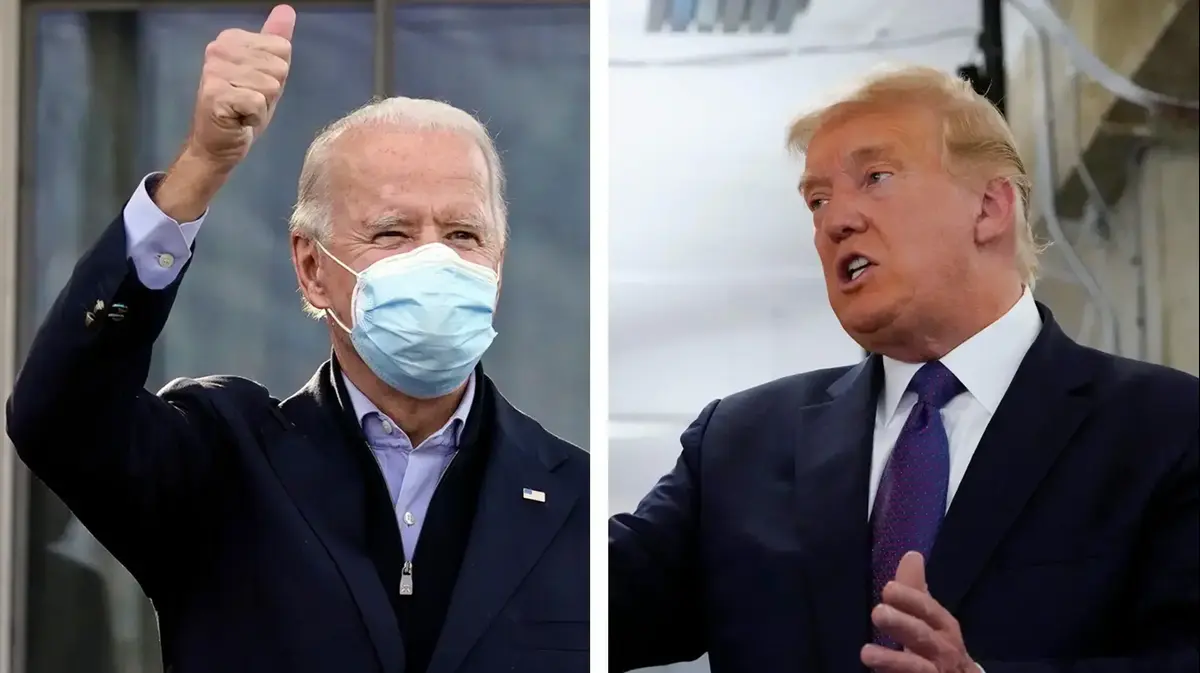In the video: hours before the polls close, Trump and Biden radiate optimism/photo: Reuters, editing: Itai Amram
While Donald Trump and Joe Biden are at the height of their primary campaign and trying to regain the trust of the American public, they themselves seem to be under attack that undermines their trust.
The Israeli cyber company BrandShield, which specializes in monitoring, tracking and removing frauds, scams, predictions and forgeries on the Internet, found record volumes of frauds and predictions across the Internet and social networks, around the characters of the two presidential candidates.
The types of scams and impersonations are many and varied.
For example, you can find sites all over the web impersonating the various campaign sites, which, among other things, allegedly offer merchandise (branded goods) in support of the candidates, impersonate official sites that distribute information about the candidate and the campaign, offer volunteer opportunities or try to raise donations.
These are not trusted sites, but sites that may put users at risk of credit stung instead of purchasing or donating, consuming false information or receiving fake products.
Have you given credit information to a site that looks like this?
The joke is on you./screenshot, presidentjoebiden.xyz
What is the scope of the phenomenon?
It turns out that the number of sites and accounts pretending to be presidential candidates is huge.
According to Brandshield, Donald Trump leads with 7,722 suspected fraud sites, 847 of which were registered last month.
In contrast, Joe Biden with 1,914 sites, 194 of which were registered last month alone.
While in some cases these are fan and supporter sites, a donation to these causes will not necessarily reach its destination and in many cases will end up in the pockets of the imposters.
In addition, there are also predictions on social networks in the form of fake profiles.
In this way, the impersonators try to spread fake news, change minds, lead to fraud websites and more.
Here, too, Trump registers a dubious victory with 523 profiles on Instagram and 225 on TikTok, compared to Biden with 420 and 192 respectively.
It can be assumed that Trump's colorful character, along with his activity on the social network, generates more buzz, so it is not surprising that at least in the field of fraud - Trump wins.
A natural solution
This is how you will improve performance and pleasure in bed - with an exclusive sale
in collaboration with "Gabra"
One of the many Tiktok accounts pretending to be Joe Biden./Documentation in social networks according to Section 27 A of the Copyright Law
Whose responsibility is it?
Yoav Keren, CEO and founder of BrandShield/Chen Galili
"The election period generates a lot of media noise, which, as we know from previous cases, easily translates into fraud, exploitation and acts of deception," says
Yoav
Keren, CEO of Brandshield.
foreign parties, this is not just a fraud of the citizen's small pocket, but a risk of widespread fraud and fake news." "
This is another example to the public of our need as consumers - whether as consumers of monetary products or as consumers of information - to be smarter," Keren adds. , "However, even those who serve as an object of imitation and counterfeiting should have responsibility, and these must arm themselves with advanced cyber defenses that match the threats that ultimately damage the credibility of their brand.
And yes, political reputation is also a brand."
How do you detect fraud on the Internet?
For the simple reader, BrandShield offers several ways to check website reliability on the net:
Check the name of the site
: if it includes a spelling mistake, double letters, incorrect spelling, etc., it is probably a scam.
Also check the content
and design: a real company that wants to sell you services, let alone a presidential candidate, will invest the necessary resources to make sure that the site's content is free of spelling errors and that its visibility is attractive and respectable.
Pixelated images and missing margins - a fake site selling Trump branded merchandise./Screenshot, donaldjtrump.com
Pay attention to the URL suffix:
Officials will often use common suffixes like .com or .co.us (in the case of the US). Random suffixes like XYZ probably do not represent a US official.
Look for the letter S after the HTTP
: indicating that the site has a security certificate.
Sites without a security certificate are inevitably suspected of fraud.
However, there are fraudulent sites that manage to obtain a security certificate, so the presence of the certificate does not guarantee the site's kosher status.
Many scams start on social networks
: the transition to the fake website is done by sending a link in a private message on WhatsApp, Facebook, Messenger, Telegram, etc.
Authentic accounts, especially when it comes to the president or a presidential candidate, should have a blue V and millions of followers at the very least, not hundreds as appears on some impostor accounts.
In addition, real companies usually do not communicate with their customers by these means unless they have received express permission to do so - by registering for the service, filling out a form, etc.
If you received such messages with any number of links, or messages from parties you do not know and did not confirm receipt of mail from, and they try to contact you directly - there is a high probability that this is a fraud.
It always helps to check:
try to make sure if there are official and well-known channels of the brand throughout the network, and not in front of the same source suspected of impersonation.
For example, a simple Google search of the candidate's name, plus the word "for president" brings up his official website.
Scam sites will usually not appear in Google or at least not at the top of the search results.
More on the same topic:
Presidential elections
US elections
Scams
Impersonation
Donald Trump
Joe Biden

